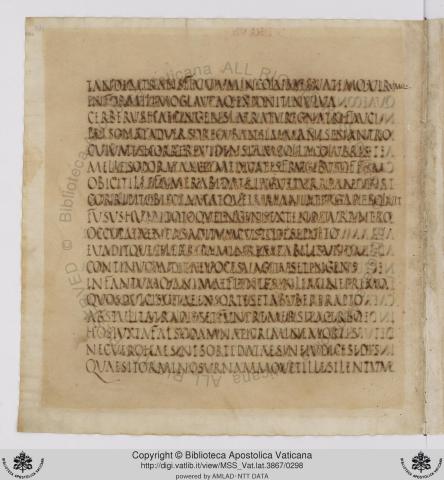Cerberus haec ingēns lātrātū rēgna trifaucī
personat adversō recubāns immānis in antrō.
Cui vātēs horrēre vidēns iam colla colubrīs
melle sopōrātam et medicātīs frūgibus offam420
obicit. Ille famē rabidā tria guttura pandēns
corripit obiectam, atque immānia terga resolvit
fūsus humī tōtōque ingēns extenditur antrō.
Occupat Aenēās aditum custōde sepultō
ēvāditque celer rīpam inremeābilis undae.425
notes
Cerberus, who guards the entrance, is rendered harmless by a drugged cake (Page).
417: rēgna: accusative after personat (Frieze): “he makes the (whole) realm echo” (Comstock). latrātū trifaucī: “with triple-throated baying.” Cerberus was triceps (“three-headed”) and hence also trifaux (“triple-throated”) by analogy with triceps. In Dante, Cerberus is even more horrible than in Vergil, and rends the gluttonous in the third circle of Hell (Inferno, Canto 6) (F-B).
418: adversō: “fronting them, opposite” (F-B); i.e., facing the bank (Knapp). Fronting them as they came from the landing-place (Conington); “facing (the ferry)” (Comstock). recubāns immānis: “reclining in his huge bulk” (F-B).
419: horrēre…colubrīs: Cerberus has snakes for hair, so that when he is angry his snakes “bristle” (Conington).
420-421: melle…conicit: “flings to him a cake made drowsy with honey and drugged meal.” Vergil may be thinking of the “honey-cake” placed at the side of a corpse by the Greeks. Offa is, however, not so much a cake as a “scrap” (Comstock) or “morsel” (Carter) of anything like bread (or broken meat (G-K)); “a cake steeped in honey and in soporific drugs.” Soporātam cannot strictly apply to melle, and must be regarded here as joined with it by a kind of zeugma. In strictness the language would be melle imbūtam et frūgibus medicātīs soporātam (Frieze). In Dante, Vergil throws earth into the brute’s maws (Inferno, Canto 6.25–27) (F-B).
421: ille: “the monster” (F-B); “the beast” (Comstock). famē: this word has its final syllable long, as if from the 5th instead of the 3rd declension (F-B).
422: obiectam: supply offam (Pharr); “the proffered morsel” (Knapp). resolvit: “lowered” (Carter); “relaxes” (Comstock). The word marks a contrast with horrēre (419) (Knapp).
422-423: immānia terga resolvit fūsus humī: “unstiffens his monstrous back, sprawling on the ground.” Resolvit and fūsus vividly express the effect of the opiate; just before his back had been rigid and every muscle strained with excitement (Page).
423: fūsus humī: humī is locative case (AG 427) (Pharr): “stretched out on the ground.” tōtō antrō: (compare line 418). The repetition emphasizes the danger that confronted Aeneas until Cerberus was rendered powerless (Knapp).
424: occupat Aenēās aditum: occupāre often means “to do something before someone or something else can act.” In this case, Aeneas acts before Cerberus ceases to feel the effects of the drug (Knapp); “he gains” or “hastens through the entrance” (Frieze). Here it seems to mean little more than adit. There is doubtless a notion of a movement quickly executed, not unlike invade viam (“hit the road”) (Conington). custōde: = Cerberō. With sepultō forms an ablative absolute (AG 419) (Pharr). sepultō: = soporātō (Knapp); i.e. in somnō (Frieze). The context makes the sense clear: “its sentry [being] buried (in sleep)” (Chase). Compare 2.265: somnō vīnōque sepultum, “buried in wine and sleep” (Page).
425: ēvādit rīpam: ēvādit is here transitive (Bennett): “passes the bank [in safety]” (Comstock); “escaping from the bank;” ēvadit is used with reference to the threatened hindrance interposed by the watch-dog (Frieze); with accusative of the space passed over (Conington). inremeābilis: “not to be recrossed” (G-K); “renavigable never” (Rhoades), apparently coined by Vergil (F-B). Rightly taken by Heyne as an ordinary epithet of the Styx (Conington).
vocabulary
Cerberus, ī, m.: Cerberus, the three-headed watch-dog of Pluto, 6.417.
lātrātus, ūs, m.: a barking; baying, 5.257, et al. (lātrō)
trifaux, faucis: (adj.), found only once (trēs and faux), three-throated., three-voiced, triple, 6.417.
personō, sonuī, sonitus, 1, n. and a.: to sound loudly; sing, play, 1.741; cause to or make resound, 6.171.
recubō, 1, n.: to be lying back or down; recline; be extended; lie, 3.392.
immānis, e: (adj.), vast, huge, immense, 1.110; wild, savage, barbarous, 1.616; cruel, ruthless, 1.347; unnatural, monstrous, hideous, 6.624; (adv.), immāne, wildly, fiercely, 12.535.
antrum, ī, n.: a cave, cavern, grotto, 1.166.
horreō, 2, n. and a.: to bristle up or be bristling, 6.419; to bristle, 11.602; (fig.), to shudder, tremble, 2.12; shudder at, fear, dread, 4.209.
collum, ī, n.: the neck of men and animals, 1.654, et al.; of a plant, 9.436; pl., the neck, 11.692.
coluber, ubrī, m.: a snake, serpent, 2.471.
mel, mellis, n., pl., mella, abl., mellibus (no gen. or dat.): honey, 6.420.
sopōrō, no perf., ātus, 1, a.: to cause to sleep or to render sleepy; to make soporific; to drug, 5.855. (sopor)
medicō, āvī, ātus, 1, a., and medicor, ātus sum, 1, dep. a. and n.: to heal with drugs; heal, 7.756; mix with drugs or poisons; medicate, drug, 6.420. (medicus)
frūx, frūgis, f.: (found usually in the pl., frūgēs, um) fruit, of the ground and of trees; fruit of the ground; corn, 1.178; wheaten meal, sacrificial grits, cake, 2.133; herbs, 6.420. (fruor)
offa, ae, f.: a mouthful, a bit, lump, morsel, 6.420.
obiciō, iēcī, iectus, 3, a.: to throw against or towards; throw to, 6.421; present, oppose, 2.444; bar against, shut, 9.45; cast upon, 7.480; subject, expose, 4.549; (pass.), to be presented, appear, 5.522; p., obiectus, a, um, thrown towards or against; opposite, projecting, 3.534. (ob and iaciō)
rabidus, a, um: (adj.), raving, savage, mad, raging, 6.421; frenzied; frantic, raving, 6.80.
guttur, uris, n.: the throat, 6.421.
pandō, pandī, passus or pānsus, 3, a.: to spread out or open, 7.641; unfurl, 3.520; extend, expose, 6.740; break through, open, 2.234; unbind, dishevel, 1.480; (fig.), disclose, declare, explain, reveal, 3.179.
corripiō, ripuī, reptus, 3, a.: to take completely or eagerly; to grasp, snatch, seize, catch, 1.45; hurry away, 1.100; tear away; hasten on, take, 1.418; raise quickly, rouse, 4.572; sē corripere, to hasten away, 6.472. (com- and rapiō)
resolvō, solvī, solūtus, 3, a.: to untie, loosen, unbind, 3.370; break apart, 9.517; dispel, 8.591; of the lips, open, 3.457; of the body, relax, unbend, extend, 6.422; of separation of body and spirit, dissolve, separate, release, 4.695; unravel, disclose, 6.29; break, violate, 2.157.
extendō, tendī, tentus or tēnsus, 3, a.: to stretch forth; stretch, extend, 5.374; continue, 12.909; magnify, advance, 6.806.
Aenēās, ae, m.: 1. A Trojan chief, son of Venus and Anchises, and hero of the Aeneid, 1.92. 2. Aenēās Silvius, one of the Alban kings, 6.769.
aditus, ūs, m.: a going to; an approach, avenue, access, passage, entrance, 2.494; (fig.), approach, 4.423. (adeō)
sepeliō, pelīvī or peliī, pultus, 4, a.: to perform the rites of sepulture, whether by interring (humāre), or cremation (cremāre); to bury, 3.41; p., sepultus, a, um, buried, 4.34; of slumber, 6.424, et al.
ēvādō, vāsī, vāsus, 3, n. and a.: to go out, forth, or up; ascend, 2.458; come in flight, 2.531; come forth from, w. the idea of danger surmounted; (w. acc.), to escape the dangers of, 2.731; escape, 5.689; 6.425; w. dat., 11.702; 9.99.
inremeābilis, e: (adj.), that can not be gone over again; not to be repassed, or retraced, 6.425; inextricable, 5.591.


